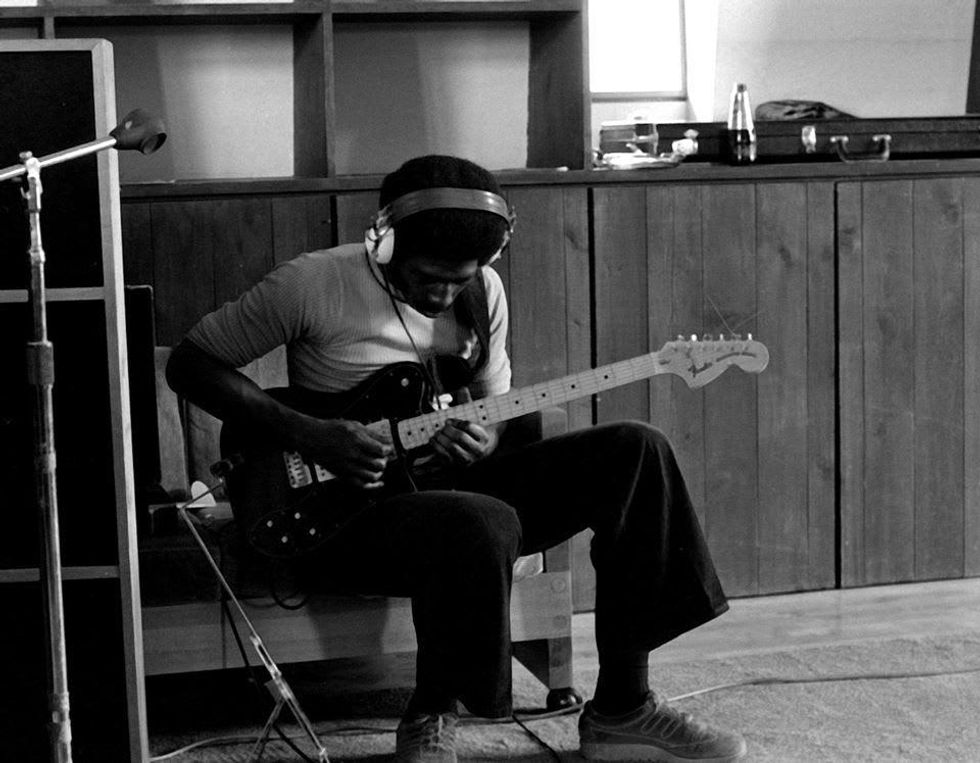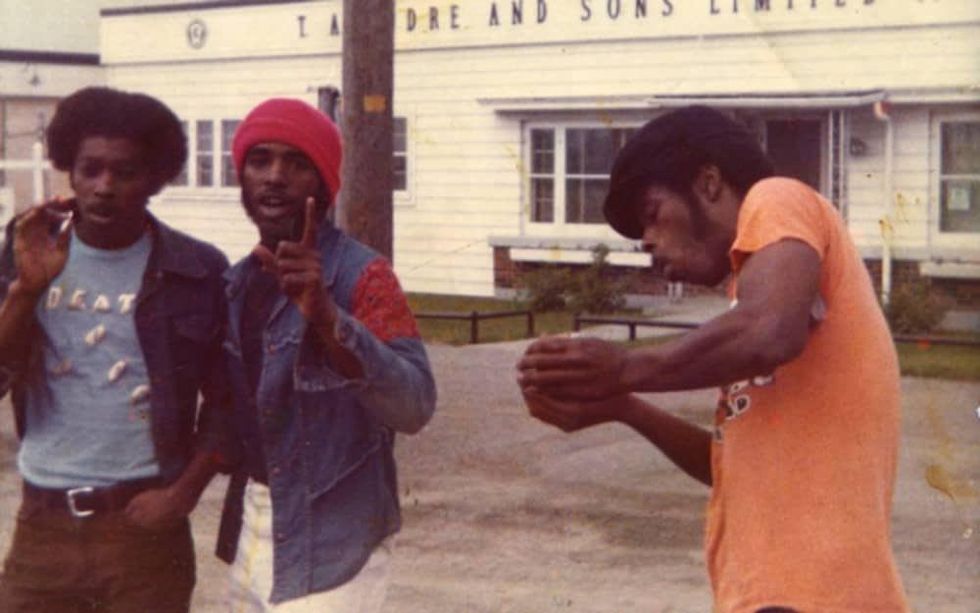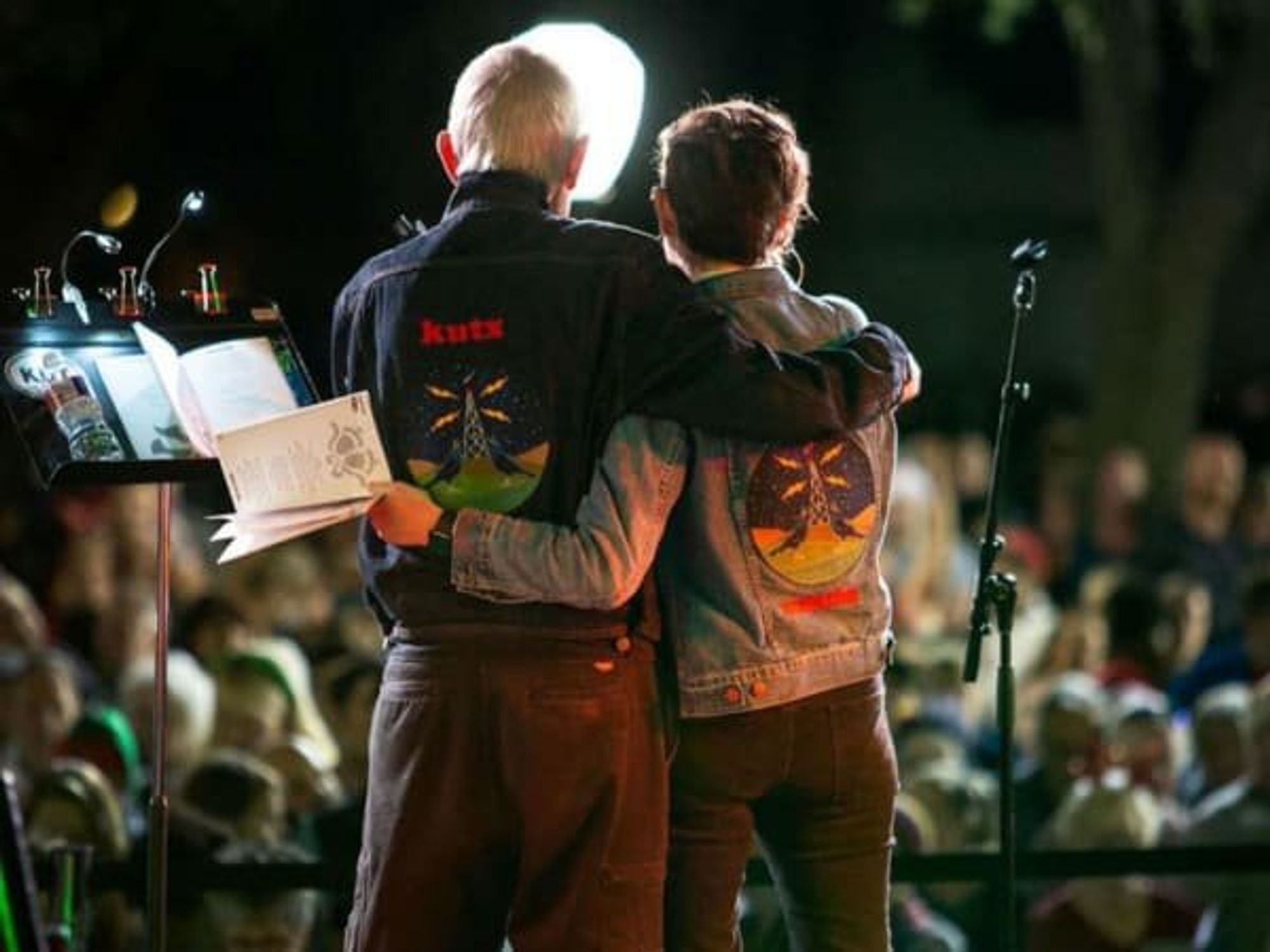Death, Love & Family
An interview with Death: Proto-punks talk about the band's unlikely resurrection
Drafthouse Films would like to tell you a story. It’s the story of how three brothers from Detroit formed a funk band in the early 1970s, but drastically changed their sound to something faster and more hardcore. They became Death, and despite falling into obscurity for over 30 years, record collectors resurrected the band's groundbreaking music and earned them the late honor of being called pioneers of punk.
The documentary A Band Called Death enters theaters on Friday, June 28, and chronicles the story of the Hackney brothers — David, Dannis and Bobby. The film follows the brothers' fight with music producers over their name, and the larger struggle of three black brothers playing in a non-Motown band. It’s a touching story of loss, triumph and family love. Brother David died in 2000 to lung cancer, but the band lives on. Today, Death is formed by brothers Dannis and Bobby, along with guitarist Bobbie Duncan.
The three members of Death, currently promoting the release of the documentary, took the time to talk with CultureMap about their music, the brother who drove them creatively, and the band’s unlikely future.
CultureMap: The three of you have performed before in Austin at Fun Fun Fun Fest and SXSW. Would you consider yourselves to be on tour at the moment?
Bobby Hackney: We more or less call it an “appearance” tour, but you know I guess you could say that. We’ve been as far away as Amsterdam and as close to here as Kansas City… When people ask us are we going to be touring, I guess the best answer we can give is what David’s concept of touring was.
And when we used to say how we were going to tour, David says, “Well, how big is the world… What if you could play every place in the world even if you only played it once?” He said, “That’s what you call a real world tour.” So really we’re on a world tour. [Laughs.]
CM: So you’re just slowly making your way?
BH: That’s right. We’re making our way.
CM: And when are you planning on releasing your next album?
BH: We hope that it will be out before the year’s end, but we are putting out a special limited edition single in July. And hopefully that will springboard into the whole album being released.
CM: Will it be a mix of new material plus songs written with David during the early days of Death?
BH: Oh, definitely. The new album has six songs from the Death songwriting catalogue. And Bobbie Duncan was basically inspired by [David’s] story so he came to us with this great song called “Relief.” We collaborated with him on that and he was also inspired by the story and he wrote three new songs, so we have a total of 10 songs, and six of those are from the Death catalogue of Detroit. We ran them by our sons in [punk band] Rough Francis… we appointed them as our panel. Anything we do we run it by them and they just went crazy over it.
CM: After the end of the initial run of Death in the 1970s, the three of you were in a reggae band called Lambsbread. Will that sound influence some of the newer material for Death going forward?
BH: We have a lot of reggae music that we did with Lambsbread, but you know this music has been such a long time coming. As my son said, it’s been heard by no one. We didn’t think it would ever be heard by someone.
So our resolve is to get as much of that Death music out as we can from the old catalogue and the new stuff that we’re doing, because the fans that are really interested in Death really want to know that there’s more music and that there’s more to come. We could mix in a lot of the reggae, but right now our main focus is to get as much of the Death music that was intended for the public that never made it to the public.
CM: How much is there of it?
BH: There’s a lot. There’s a lot of songs of that were unrecorded, and there’s some demos. And there may be another historical project coming through Drag City Records. That will actually make it into kind of a triangle. You have… For the Whole World to See and then you have the second release, which is Spiritual-Mental-Physical and is kind of some demos and some takes and some ideas that Death was doing. And there’s a third project that we’re contemplating — the third historical project.
CM: You were Rock Fire Funk Express before you became Death. Even after your big detour into rock, would you say that the influences of Motown still stuck with the band?
Dannis Hackney: It was because Rock Fire Funk actually, that was the start of our identity seeking. And Rock Fire Funk, being our first band — it lasted about 8-9 months — after those days is when me and David kind of discovered through other bands that we want to play this rock ‘n’ roll stuff, man. This is the fun music.
CM: And when you gravitated towards rock, was it mostly because it was so different to you?
DH: Oh yeah it was a big difference because I had happened to see Alice Cooper, and never having experienced a rock ‘n’ roll band and all of a sudden bam there’s Alice Cooper, as Billy Idol would have said it’s a “Shock to the System.” [Laughs.] And I was just mesmerized by what those dudes were doing… This guy looked like he was ready to throw the set right at you. [Laughs.] It was just so much reckless abandon and I was just like, “That looks like fun.”
I came back to [my brothers] and I said, “Guys, I saw this guy called Alice Cooper.” That’s as much as I knew. He was Alice Cooper, not the band. And then the next week after, [Bobby] went out and bought a bunch of Alice Cooper records, because he was the great record collector. I mean 3,000 albums up in our room.
BH: …Every Friday I would go to [the record store] and for 12 bucks you could walk out with about three albums. And so we was looking for everything. I was just looking for anything rock ‘n’ roll. Anything that had great artwork I would buy it. … All that music was just for study.
CM: And it’s funny because it was record collecting that brought you guys back.
BH: That’s just crazy. We talk about that all the time, how it’s so surreal that we’ve come along at a time of the vinyl resurgence. The whole Death story was just waiting to meet that thing.
CM: After that resurgence in vinyl sales and the cover songs by Rough Francis, you guys were specifically asked to come back. But with the loss of David in 2000 there was a huge void that needed to be filled on guitar, and you went with Bobbie Duncan from Lambsbread. I’m sure there was a huge weight on your shoulders at the time, Bobbie, but has it been lifted at this point?
Bobbie Duncan: Well yeah, there was a weight on my shoulders, but fortunately I joined [Lambsbread] seven years ago. We were playing reggae and jazz, you know, and R&B, so we were currently already in shape. And I came to rehearsal one Thursday night they put down this CD and drops it on me.
And I was like; “Wow” because you know I didn’t know much about Dave, I mean they had mentioned him. I know about him now. [Laughs.] I took the CD home and immediately fell in love with it, like with the first three songs I couldn’t wait to get into it. We had to go through a retraining of ourselves, because like Dannis was saying, we were doing other stuff that was kind of laid-back, but when you’re doing rock ‘n’ roll you gotta be moving your butt. [Laughs.]
But the thing about it though is it’s so much fun, and you know the joy of playing the music it’s actually given me a new muse… a new energy.
…But I also realized that it’s more [than] a gig. This is a spiritual thing. This is more than just playing, you know. It’s beautiful. It’s awesome. I’m blessed to be in a position to fill a man’s shoes. Hey, Dave, I’m trying. [Laughs.]
BH: Oh, believe me, he’s got your back. [Laughs.]
---
The documentary A Band Called Death is available on iTunes, VOD and digital download now. The film will be released into theaters on Friday, June 28, and you can find a theater near you on the film’s official website.



